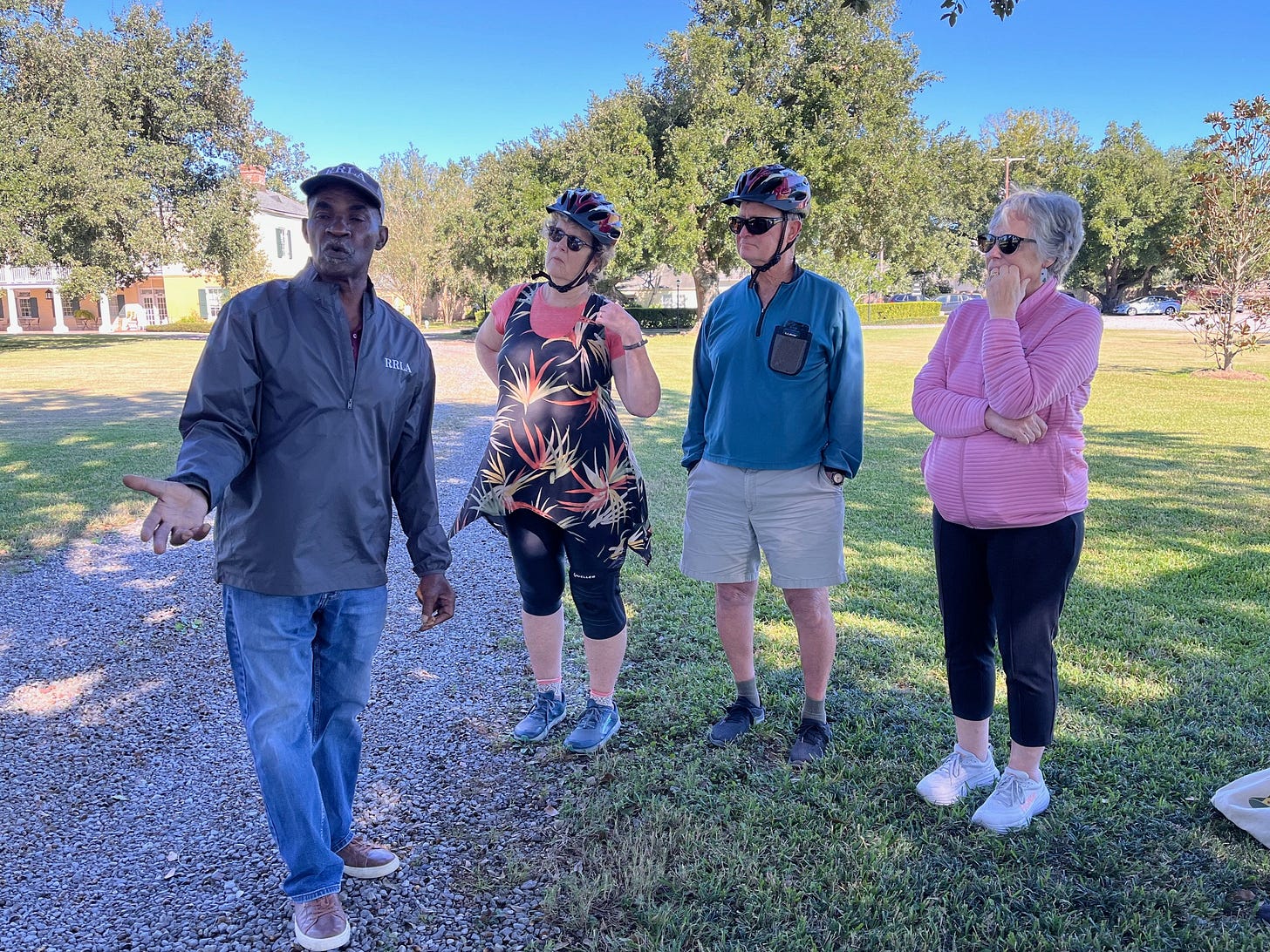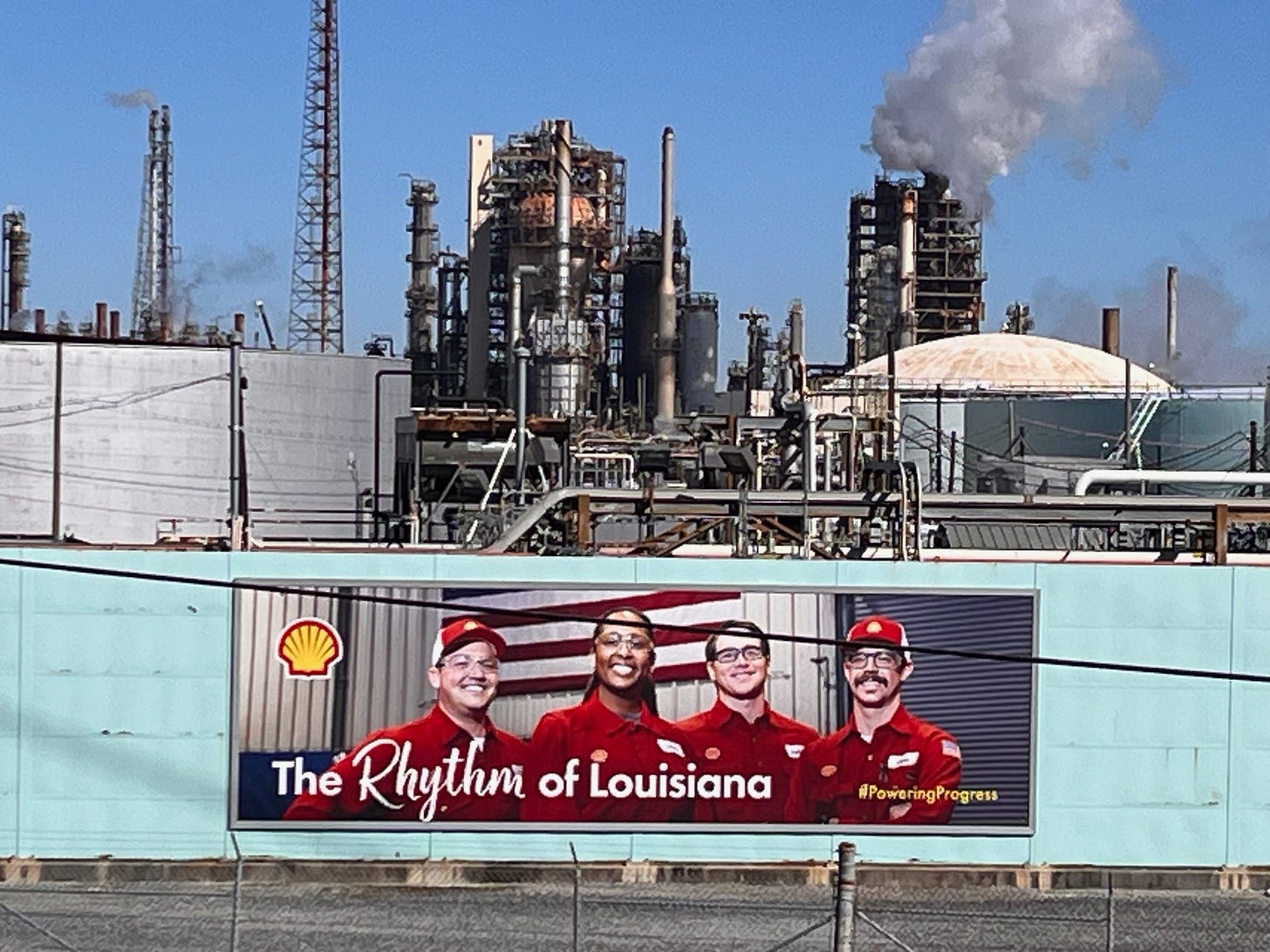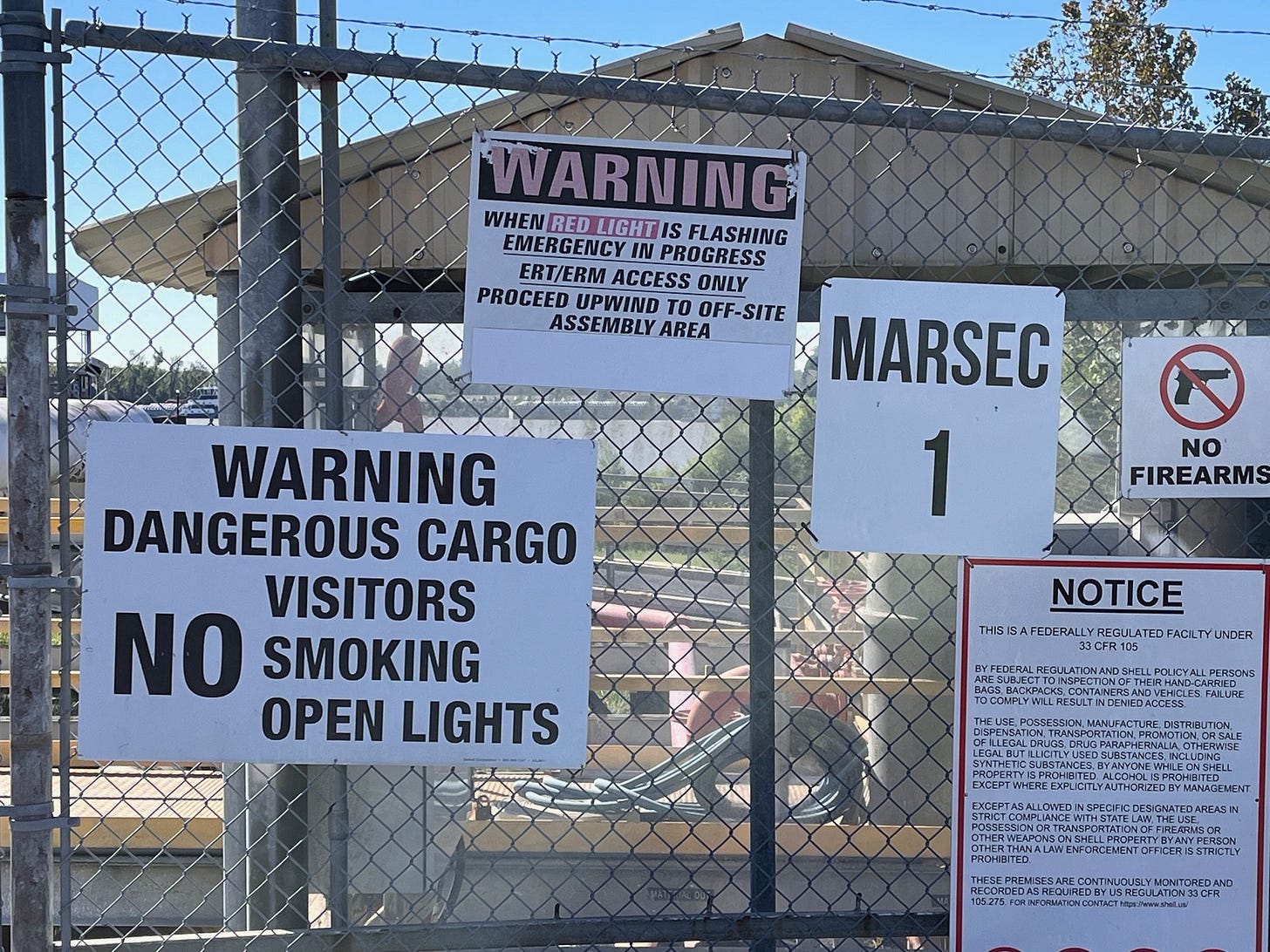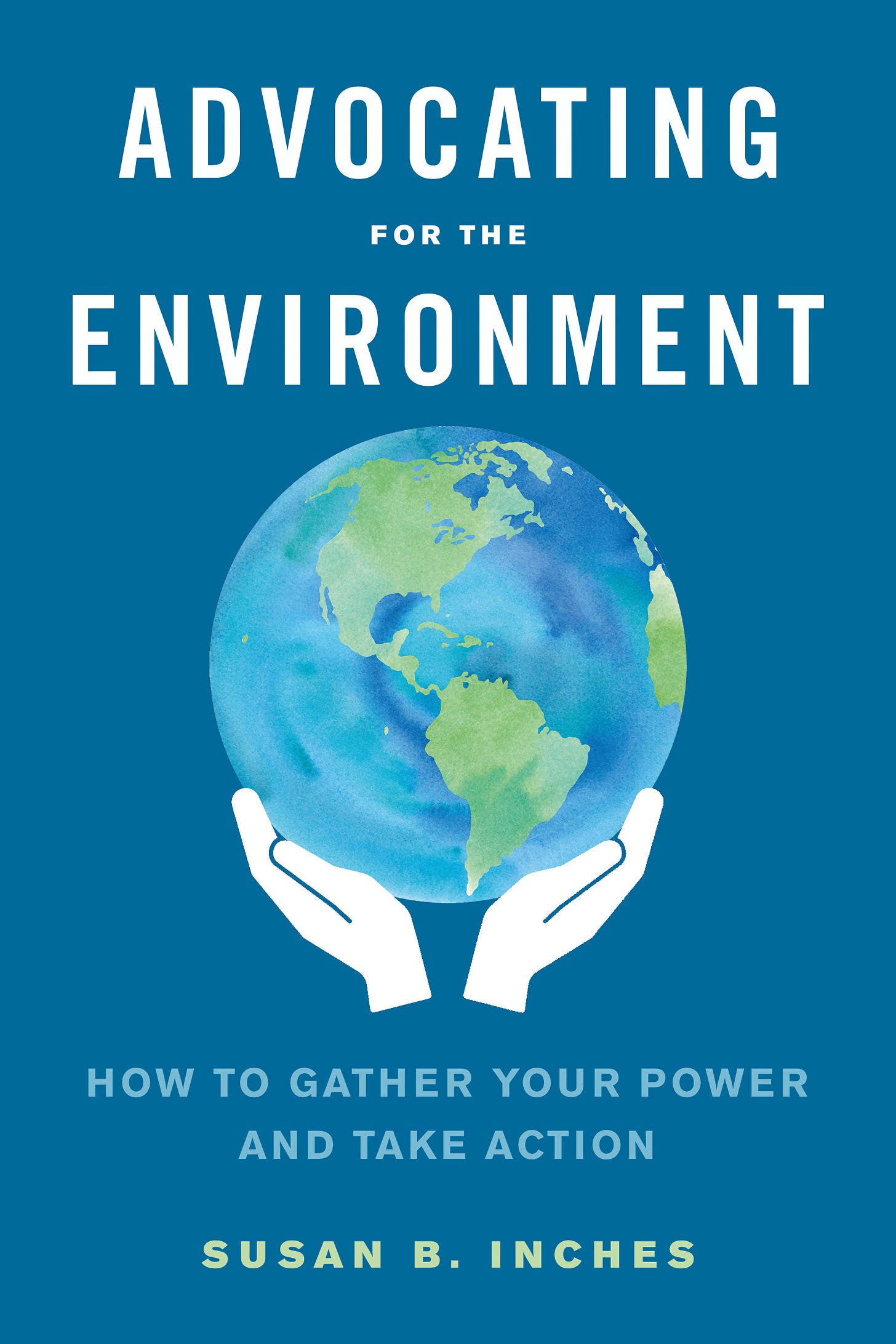
Cancer Alley is the nickname given to 80 miles of the Mississippi between Baton Rouge and New Orleans. There are 140 petrochemical plants along the river there. The area is also home to many working class people, a majority of them Black.
Two days after the election, I left for Mississippi and Louisiana with a group of five from my Congregational church in Yarmouth, Maine. Our mission was to spend 10 days witnessing and learning about the struggle for civil and environmental rights in these places.
The first thing you notice there are huge refineries. Tall smokestacks spew toxic chemicals. Methane flares light up the sky. The scale of industrialization is hard to imagine---there are miles and miles of factories and chemical plants.
Sandwiched between them are small communities, many settled after the Civil War. In places the only thing separating industrial complexes from homes, schools and churches is a seven foot chain link fence. Residents there face a cancer risk fifty times higher than the average in this country—hence the nickname Cancer Alley.
I wasn’t sure how a group of white people from the north would be received in these places. But we found warm and welcoming people. There are a dozen or more grass roots organizations in Cancer Alley working for the right to clean air, clean water and a healthy environment. We met with organizers from four of them.
Meeting these leaders was inspiring! They are up against state and local governments that invite multinational corporations to move into their neighborhoods. They don’t have money, connections or graduate degrees. But what they do have is faith. They told us God is in their hearts and God is directing their action.
Barbara Washington, one of the founders of a group called Inclusive Louisiana put it this way, “We know we are up against Goliath, but with God all things are possible.” Sharon Lavigne, founder of RISE St. James said, “God told me to fight, and nothing is going to stop me.”
Several organizers referenced the David and Goliath story to describe their situation. Like David, they are nimble and creative in their activism. Like Goliath, they know they are up against huge corporations that answer only to shareholders and hungry markets demanding oil, gas, fertilizer, chemicals and plastics.
I’m an old fashioned Yankee who believes that every person is a child of God, with spirit guides who are always with them. But like most Yankees, I don’t talk about this openly.
My reticence could be due to fear of being rejected. Or it could be that I don’t want to be labeled as a MAGA evangelical, when my politics are the opposite of that. Or perhaps my Yankee faith is too precious to share, like a diamond that must be kept in a safe deposit box for fear of being stolen.
Whatever the reasons for hiding our faith, we can take a lesson from the Cancer Alley organizers. We are entering a difficult period for our country, characterized by conflict, character assassination and possibly violence. These times call us to celebrate and act on our faith more openly.
But faith does not have to be expressed through religion. Faith is a heartfelt conviction about what we know is right and true, even when daily evidence is missing.
Some of the most faithful people I know are not affiliated with a church. Faith reflects core values: what do you absolutely know is right, deep in your heart?
Cancer Alley organizers know in their hearts that they deserve clean air and water. They do not identify themselves as victims, even though they legitimately could. They are subject daily to racism, corporate indifference and a system that offers them little opportunity.
But instead of seeing themselves as victims, they see themselves as whole human beings deserving of clean air, clean water and a healthy life. Their stand is hugely inspiring!
There’s something else Cancer Alley organizers can teach us: Positive action is the antidote to fear and despair. The Cancer Alley organizers know their core values and will work for them tirelessly, no matter the odds against them. This gives their lives purpose, meaning and joy.
A member of my church once asked me how I keep doing the work I do, without becoming discouraged or disheartened. In response I admitted I have my bad days. I admitted that I can’t change the world.
I also said that by taking action, I find purpose and satisfaction. I know I’m doing my best to make a positive contribution. The true reward of committed action is to die with no regrets.
As our country enters a period of great uncertainty, we need purposeful and faithful action more than ever.
What can you do to find your faith and take action? What can you commit to that will bring you meaning, purpose and joy?
Learn More about Cancer Alley HERE.
How did Cancer Alley Get This Way?
There are many things that could be done to improve the air and water quality in Cancer Alley. Fenceline and neighborhood air quality monitoring is a logical thing to do, for example.
But this isn’t being done. Why? Lack of political will. Louisiana’s Legislature and Department of Environmental Quality believe that locating corporations alongside communities is “good for the economy.” The health of people—especially Black people—are not as important as “the economy”.
It’s important to understand that in this context “the economy” means multi-national corporations. The people benefitting from this “economy” are distant shareholders. Professional engineers who work at the refineries also benefit. Very few locals are hired to work there.
The local economy is a different story. It has taken a beating since the refineries came. Property values have declined. Local businesses have closed.
We visited the towns of Donaldsonville, Welcome and Convent. What you see there are run down properties, empty lots and closed up businesses.
You also see blue tarps on roofs damaged by hurricane Ida in 2021. The tarps remain because people don’t have the funds for roof repair.
Who wants to live or have a business next to the Shell Chemicals Park, Noranda Alumina or Union Carbide? Most people don’t. Most who could afford to move have left.
As I prepared this newsletter I had a startling realization: the underlying argument supporting slavery and supporting the petrochemical plants today is the same---making money and maximizing profits.
When the south was defending slavery, the fear was that without free labor, the plantations would go under. Many did.
Today the fear is that stricter regulations would cause the petrochemical plants to move to less regulated places. They probably would.
As a result, the people in the river parishes (Cancer Alley) must live with toxic emissions, continuous methane flares, leaking valves, chemical spills and spotty air quality monitoring.
They bear the costs in the form of sickness, lengthy and painful health treatments, huge health care bills, loss of schools and churches, and loss of life. A warming climate and the decline of nature are costs all of us pay.
We questioned slavery and overturned it. It was painful. But our southern states have figured out how to have agriculture without slaves. Mississippi now has 34,700 farms and $8.8 billion in agricultural sales.
Now it’s time to question the petrochemical industries. It’s time to confront irresponsible practices, strengthen regulations, and figure out how to make products without poisoning people.
A great Christmas gift….
Get my book in ebook, audiobook or paperback wherever books are sold. Or order HERE.







Thank you so much for reflecting on spirituality in this excellent piece Sue. So timely, inspiring...and sobering.
Thank you, Sue, for the work you are doing.